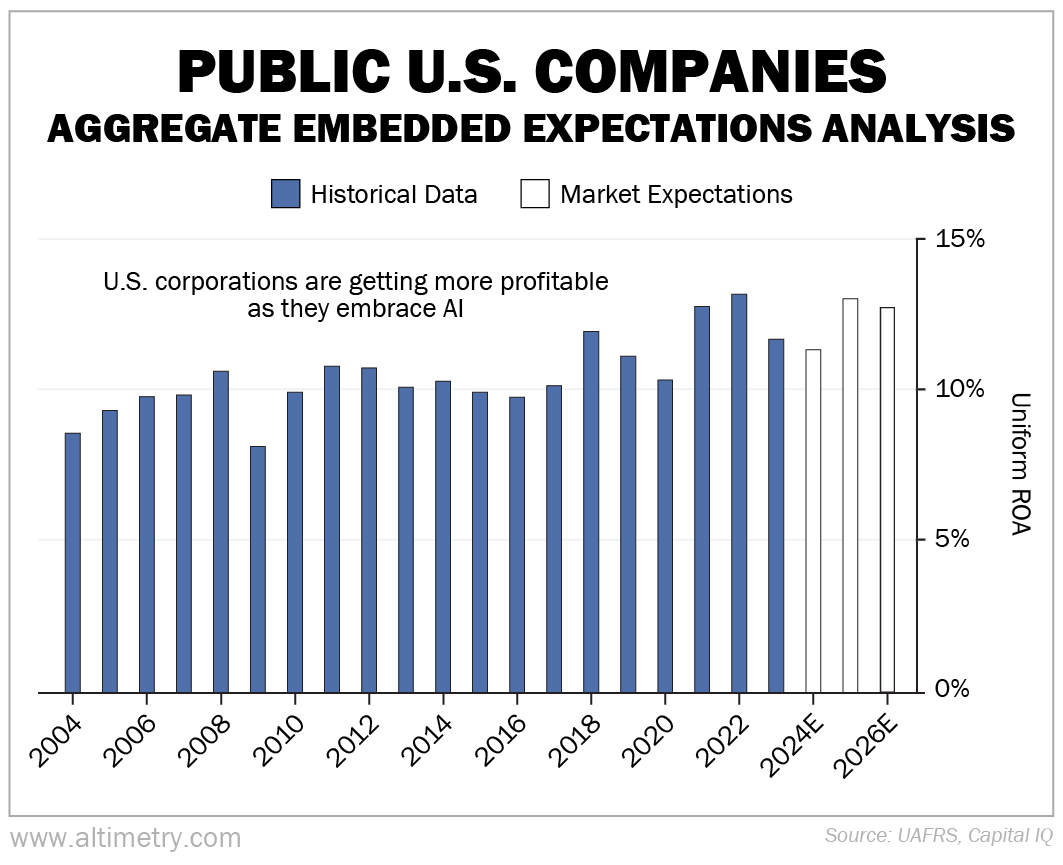 Most people still think of AI as simple assistants – tools to help with basic research or repetitive tasks...
Most people still think of AI as simple assistants – tools to help with basic research or repetitive tasks...
And that's true to an extent... AI assistants like ChatGPT are fantastic at pulling data, drafting documents, and helping organize information.
But AI agents go further. They don't just assist – they perform. They're capable of handling high-stakes, complex tasks autonomously. And they're poised to reshape industries.
We've been seeing a lot more of these agents crop up lately. BlackRock's (BLK) Aladdin platform, for example, has been a game changer in financial markets...
Aladdin doesn't just help manage portfolios – it takes on complex tasks like risk analysis and crafting investment strategies. This transformation from AI assistant to AI agent is where the future is heading.
Today, we'll dive into how AI agents are revolutionizing business productivity... and why they're set to drive the next wave of market growth.
 You might ask ChatGPT to find companies that made big acquisitions last quarter...
You might ask ChatGPT to find companies that made big acquisitions last quarter...
But after it pulls the data, you still need to manually adjust for underreported revenue or inflated asset values. It's a slow, labor-intensive process.
An AI agent, however, would take care of all those adjustments for you. It would comb through the financial statements, make the necessary calculations, and hand you the final product.
You'd be able to review 20 companies in the same amount of time it used to take to review two.
That's the kind of efficiency we're talking about.
In sales, AI agents are an even bigger game changer. Imagine a system that not only finds leads but crafts personalized emails, sends follow-ups, and even schedules meetings – all on its own. The salesperson just has to handle the final conversation.
This kind of automation could mean a dramatic boost to sales teams' effectiveness, helping companies grow faster than ever before.
 Software giant Microsoft (MSFT) has been an early adopter of AI agents...
Software giant Microsoft (MSFT) has been an early adopter of AI agents...
It's using them to boost productivity across its operations.
The company has nearly doubled both its profits and revenue since 2019 thanks to its commitment to this new technology. And operating profits from its AI-focused intelligent cloud division have jumped from $14 billion to $50 billion in that period.
Microsoft isn't the only company that's seeing the benefits of AI, either. This trend is taking place across the market.
We can see this through our aggregate Embedded Expectations Analysis ("EEA") framework.
We start with the average stock price of all publicly listed U.S. corporations. From there, we can calculate what the market expects from future cash flows. We then compare that with our own cash-flow projections.
In short, it tells us how well U.S. companies have to perform in the future to be worth what the market is paying for them today.
Uniform ROA hit record highs in 2022, in part because of AI advancements. And as AI improves productivity throughout the market, investors expect returns to reach 13% levels again in 2025...
As more companies follow Microsoft's lead, the market expects productivity to improve... and returns will follow suit.
Investors are starting to price in these efficiency gains. That could justify higher valuations across the board.
 The rise of AI agents represents a monumental shift – and if you have money in the markets, you should pay attention...
The rise of AI agents represents a monumental shift – and if you have money in the markets, you should pay attention...
AI assistants have already proven valuable. But the companies that move beyond assistants to full AI agents will dominate the market in the years to come.
We're already seeing this play out with tech giants like Microsoft. It seems much of the market is ready to join the trend.
The future belongs to AI agents – and the companies that adopt them first are the ones to watch.
Wishing you love, joy, and peace,
Joel
October 18, 2024



 Most people still think of AI as simple assistants – tools to help with basic research or repetitive tasks...
Most people still think of AI as simple assistants – tools to help with basic research or repetitive tasks...


